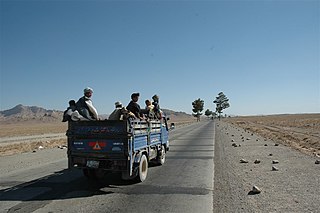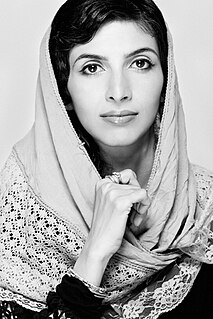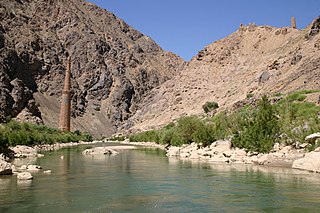Related Research Articles

Afghanistan, officially the Islamic Republic of Afghanistan, is a landlocked country at the crossroads of Central and South Asia. Afghanistan is bordered by Pakistan to the east and south; Iran to the west; Turkmenistan, Uzbekistan, and Tajikistan to the north; and China to the northeast. Occupying 652,000 square kilometers (252,000 sq mi), it is a mountainous country with plains in the north and southwest. Kabul is the capital and largest city. The population is around 32 million, composed mostly of ethnic Pashtuns, Tajiks, Hazaras, and Uzbeks.

Herāt is the third-largest city of Afghanistan. In 2020, it had an estimated population of 574,276, and serves as the capital of Herat Province, situated in the fertile valley of the Hari River in the western part of the country. It is linked with Kandahar, Kabul and Mazar-i-Sharif via Highway 1 or the ring road. It is further linked to the city of Mashhad in neighboring Iran through the border town of Islam Qala, and to Mary in Turkmenistan to the north through the border town of Torghundi.

Radio Free Europe/Radio Liberty (RFE/RL) is a private, nonprofit, international multimedia broadcasting corporation, funded by a grant from the U.S. Congress through the Agency for Global Media, an independent federal agency that oversees all U.S. civilian international media. It serves as a free pro-democratic press in countries where the "free flow of information is either banned by government authorities or not fully developed."

The Islamic Movement of Uzbekistan was a militant Islamist group formed in 1998 by the Islamic ideologue Tahir Yuldashev, and former Soviet paratrooper Juma Namangani—both ethnic Uzbeks from the Fergana Valley. Its original objective was to overthrow President Islam Karimov of Uzbekistan, and to create an Islamic state under Sharia; however, in subsequent years, it reinvented itself as an ally of Al-Qaeda. The group also maintained relations with Afghan Taliban in 1990s. However, later on, relations between both the Afghan Talibans and Islamic Movement of Uzbekistan started declining. In mid-2015 its leadership publicly pledged allegiance to the Islamic State of Iraq and the Levant (ISIL) and announced that the IMU was part of the group's regional branch. In 2016, it was reported that a new faction of Islamic Movement of Uzbekistan emerged after the group became part of Islamic State (IS). The new faction retained the group's name and was independent of Islamic State (IS). It has also indicated that it is loyal to al-Qaeda and the Taliban and shared their views against the Islamic State (IS).

The Kabul–Kandahar Highway (NH0101) is a 483-kilometer (300 mi) road linking Afghanistan's two largest cities, Kabul and Kandahar, passing through Maidan Shar, Saydabad, Ghazni, and Qalati Ghilji. This highway is a key portion of Afghanistan's national highway system or "National Highway 1". The entire highway from Kandahar to Kabul is on flat surface, with no mountain passes. Approximately 35 percent of Afghanistan's population lives within 50 km (31 mi) of the Kabul to Kandahar portion of the Ring Road.

The Golden Needle Sewing School was an underground school for women in Herat, Afghanistan, during the rule of the Taliban. Because women were not allowed to be educated under the strict interpretation of Islamic law introduced by the Taliban, women writers belonging to the Herat Literary Circle set up a group called the Sewing Circles of Herat, which founded the Golden Needle Sewing School in or around 1996.
Professor Abdul Ghafoor Ravan Farhâdi is an Afghan academic and diplomat who served as Afghanistan's Ambassador to the United Nations from 1993 to 2006.
Abdul Malik Pahlawan is an Uzbek warlord and politician based in Faryab Province in northern Afghanistan. He is the head of the Afghanistan Liberation Party and was heavily involved in the factional fighting that consumed Afghanistan throughout the 1990s. His rival for the control of the Uzbek north is Rashid Dostum, and their militias have clashed several times since the fall of the Taliban.

The Kandahar–Herat Highway is 557-kilometer (346 mi) section of road that links the cities of Kandahar and Herat in Afghanistan. This highway is part of a larger road network, the "Ring Road", and was first constructed by the Soviets in the 1960s. The Kandahar-Herat Highway is made up of two sections of "National Highway 1": NH0101 runs from Kandahar to Girishk, and NH0102 runs from Girishk to Herat.
Brigadier General Gul Aqa Nahib of the Afghan National Army served as second-in-command to transitional Defence Minister Mohammed Fahim in 2002 and is currently in charge of 12,000 troops overseeing operations in Kandahar.

Roya Mahboob is a businesswoman and entrepreneur from Afghanistan. She founded and serves as CEO of the Afghan Citadel Software Company, a full-service software development company based in Herat, Afghanistan. She has received attention for being among the first IT female CEOs in Afghanistan, where it is still relatively rare for women to work outside the home. On 18 April 2013, Roya Mahboob was named to TIME magazine's 100 Most Influential People in the World for 2013 for her work in building internet classrooms in high schools in Afghanistan and for Women's Annex, a multilingual blog and video site hosted by Film Annex. This was the 10th anniversary of the TIME special edition. The Women's Annex platform give the women of Afghanistan and Central Asia a platform to tell their stories to the world. The TIME magazine introduction to Roya Mahboob was written by Sheryl Sandberg who is the Chief Operating Officer of Facebook and the author of "Lean In: Women, Work and the Will to Lead". U.S. Secretary of State John Kerry met with Roya Mahboob and other Afghan women entrepreneurs at the International Center for Women's Economic Development at the American University of Afghanistan. She is also known for her work with online film distribution platform and Web Television Network Film Annex on the Afghan Development Project. She is a current advisor at the Forbes School of Business & Technology.

The Musalla complex, also known as the Musallah Complex or the Musalla of Gawhar Shah, is a former Islamic religious complex located in Herat, Afghanistan. The 15th-century complex is in ruins today. The complex ruins consist of the five huge 55 metre Musallah Minarets of Herat, mausoleums of Mir Ali Sher Navai, Sultan Husayn Mirza Bayqara and the ruins of a large mosque and a madrasa complex. Construction on the complex was begun in 1417 under Queen Goharshad Begum, the wife of Timurid ruler Shah Rukh who established Herat as the capital of the Timurid Empire.

The Islamic State of Iraq and the Levant – Khorasan Province is a branch of the militant Islamist group Islamic State of Iraq and the Levant (ISIL) active in South Asia and Central Asia. Some media sources also use the terms ISK, ISISK, IS-KP, ISIS-K, or Daesh-Khorasan in referring to the group. The Khorasan group's main activity is in the border region of eastern Afghanistan and northern Pakistan, but its area of operations also includes other parts such as Tajikistan, and India where individuals have pledged allegiance to it.
Baad Pakh is a district in Laghman Province, Afghanistan.
Events from the year 2020 in Afghanistan.

The COVID-19 pandemic in Afghanistan is part of the worldwide pandemic of coronavirus disease 2019 caused by severe acute respiratory syndrome coronavirus 2. The virus was confirmed to have spread to Afghanistan when its index case, in Herat, was confirmed on 24 February 2020.
This article documents the timeline of the COVID-19 pandemic in Afghanistan.

On May 1, 2020, a group of Afghan migrants seeking work tried to enter Iran and drowned in the Hari River on the border between Iran and Afghanistan.
Laleh Osmany, Pashto: لله عثماني is a women's rights activist from Afghanistan, who founded the social media #WhereIsMyName campaign which opposes the tradition that women's names are not used publicly in Afghanistan. For her work she was recognised on the BBC's 100 Women Awards in 2020.
References
- ↑ "Oil in Afghanistan". Radio Free Europe Radio Liberty. Radio Free Europe Radio Liberty. Retrieved 10 January 2019.
- ↑ Zeyaratjaye, Jawid (19 September 2017). "Kidnappers Kill Three Herat Customs Officials". Tolo News. Retrieved 14 January 2019.
| | This Herat Province, Afghanistan location article is a stub. You can help Wikipedia by expanding it. |